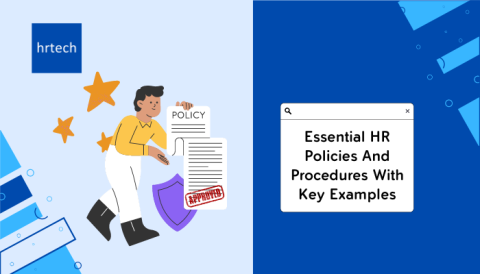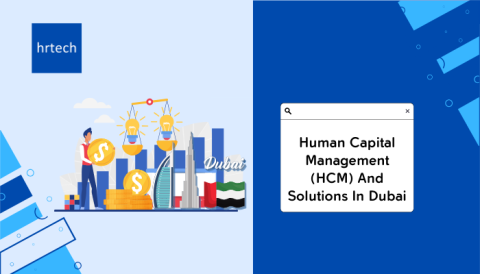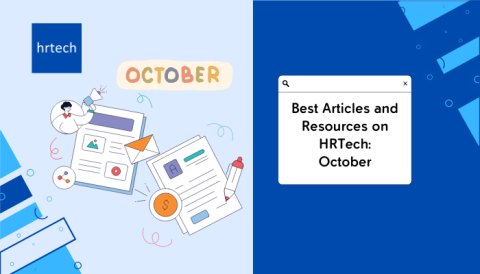Read out this guide which will provide insights into how HR technology can help organisations achieve their talent priorities and business goals with best HR practices.
by Sanika Sarmalkar, Junior Consultant – Digital HR, hrtech
In today’s fast-paced and constantly evolving business landscape, leveraging HR technology has become essential for organisations to stay competitive and meet their talent priorities and achieve their business goals. By leveraging HR technology, organisations can enhance their HR best practices, which are a set of processes and policies designed to improve organisational effectiveness and enhance employee satisfaction. This comprehensive guide will provide insights into how HR technology can help organisations achieve their talent priorities and business goals with best HR practices.
What is HR Technology?
HR Technology refers to the use of digital HR tools and HR software designed to automate and streamline various HR processes. HR technology can range from basic tools such as email and spreadsheets to more advanced tools such as applicant tracking systems, learning management systems, and benefits administration software. In summary, HR technology is a critical tool for modern HR professionals looking to streamline HR processes. In our blog post, “Best HR Software in India,” we explore some of the top HR software solutions available in India. Whether you’re a small business owner or an HR professional at a large corporation, our blog post provides a comprehensive list of HR software solutions that can meet your needs.
What are HR Best Practices?
HR Best Practices refer to a set of HR processes and policies that have been shown to improve organisational effectiveness and enhance employee satisfaction. The following are some of the key HR best practices that can be improved through the use of HR technology.
The below are the 8 HR Best Practices,
- Recruitment and Selection
- Training and Development
- Employee Benefits
- Compensation & Benefits
- Compliance Issues
- Providing Security to Employees
- Self Managed & Effective Teams
- Terminations
Recruitment and Selection:
Recruiting and selecting the right employees is essential for any organisation’s success. HR technology, such as Smart Applicant Tracking Systems (ATS), can automate the recruitment process, from posting job vacancies to scheduling interviews. This not only saves time but also ensures that the best candidates are selected for the job.
Training and Development:
Employee training and development are crucial for enhancing employee skills and productivity. HR technology, such as Learning Management Systems (LMS), can deliver personalised training to employees, making the process more efficient and effective.
Employee Benefits:
Offering employee benefits is an excellent way to attract and retain top talent. HR technology, such as benefits administration software, can streamline the administration of employee benefits, from healthcare to retirement plans, making it easier for employees to manage their benefits. HR Tech tools such as Earned Wage Access platforms and ESOP Management tools can help you attract and retain top talent.
Compensation & Benefits:
Compensation is a crucial factor in employee satisfaction and retention. HR technology, such as compensation management software, can help organisations manage their compensation plans and ensure that they are competitive in the market. Moreover, payroll software is another HR technology that simplifies the payroll process by automating tasks such as calculating taxes, generating payslips, and processing payments. To manage employee compensation and payroll efficiently, companies must invest in the right HR technology tools. Check out our blog on the “Best Payroll Software in India” for more information.
Compliance Issues:
Ensuring compliance with employment laws and regulations is critical for any organisation. HR technology, such as Global Employment Platforms / Employers of Records can save organisations the time and cost of figuring out corporate structures, banking regulations, tax considerations, legal liability, technology, regulatory HR compliance, etc while expanding globally.
Providing Security to Employees:
Providing security to employees is essential for creating a safe and comfortable work environment. HR technology, such as employee safety and security software, can help organisations monitor workplace safety, track incidents, and mitigate risks.
Self-Managed and Effective Teams:
Self-managed and effective teams are crucial for organisational success. HR technology, such as team collaboration and communication software, can help teams work more effectively and efficiently, improving overall team performance.
Terminations:
Terminations are an inevitable part of the employment cycle. HR technology, such as termination management software, can help streamline the termination process, ensuring that it is done fairly and consistently. HR Applications, such as HRMS take care of all HR needs across the employee life-cycle from hire to retire.
Learn More About Current HR Tech Market Landscape & Trending HR Tech Tools in our 2023 HR Tech Market Outlook Report
Difference Between HR Practices and Activities
HR practices refer to a set of processes and policies that have been shown to improve organisational effectiveness and enhance employee satisfaction. HR activities, on the other hand, refer to the day-to-day tasks and duties that HR professionals perform to support these practices
Why Leverage HR Technology for Best Practices?
Leveraging HR technology can be a game-changer for organisations in achieving their HR best practices. With the automation and streamlining of HR processes, HR professionals can focus on strategic initiatives such as talent development and workforce planning. HR technology can also provide real-time insights and data analytics, enabling better decision-making and more accurate HR forecasting. Furthermore, the use of HR technology can enhance employee engagement by providing modern, tech-savvy HR processes and tools, resulting in a positive employee experience.
Conclusion
In conclusion, HR technology is a critical tool for organisations to improve their HR best practices. By leveraging HR technology, organisations can streamline their HR processes, enhance employee engagement, and increase overall productivity. The right HR technology solution can automate HR processes, provide accurate HR data and insights, and enable HR professionals to focus on strategic initiatives. To leverage HR technology for best practices, organisations must identify their HR needs, assess the available HR technology solutions, select the right HR technology, and provide adequate training and support to HR professionals.
About the Author:

Sanika Sarmalkar is part of the Digital HR Advisory & Consulting team at hrtech. With a Masters in HRM and a background in creative content writing, she is a HRTech evangelist who aims to encourage Enterprise HR Teams to adopt new-age HRTech solutions, and thereby enable their transition into becoming a Strategic HR Business Partner.





